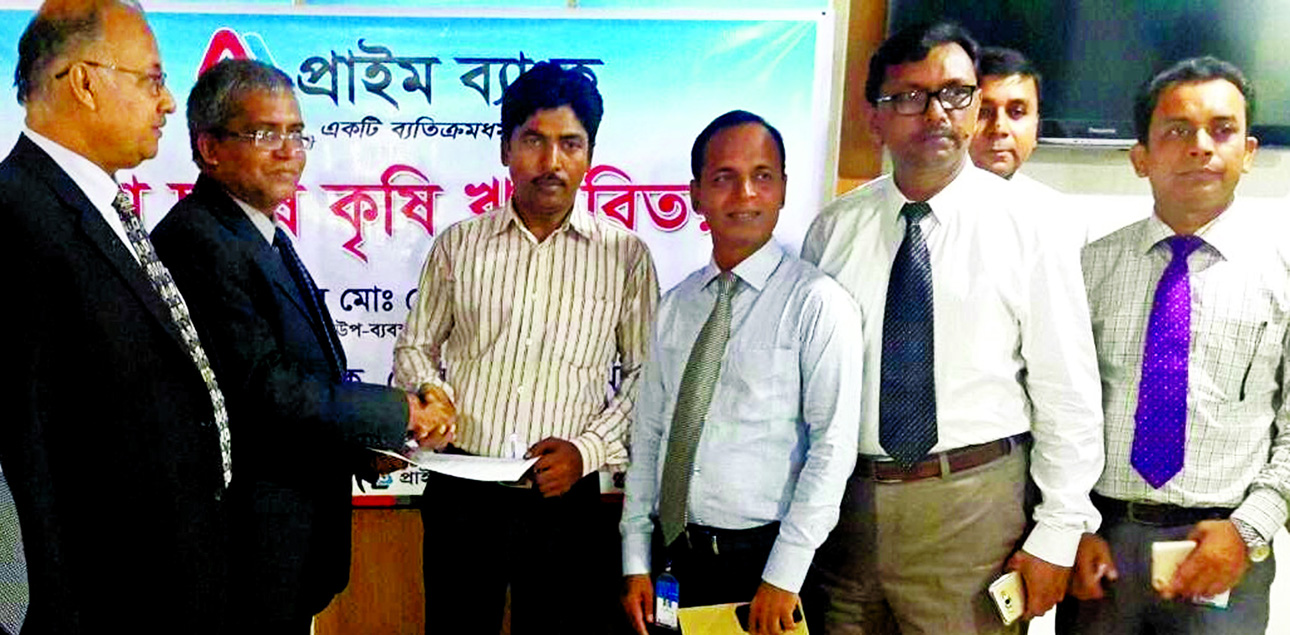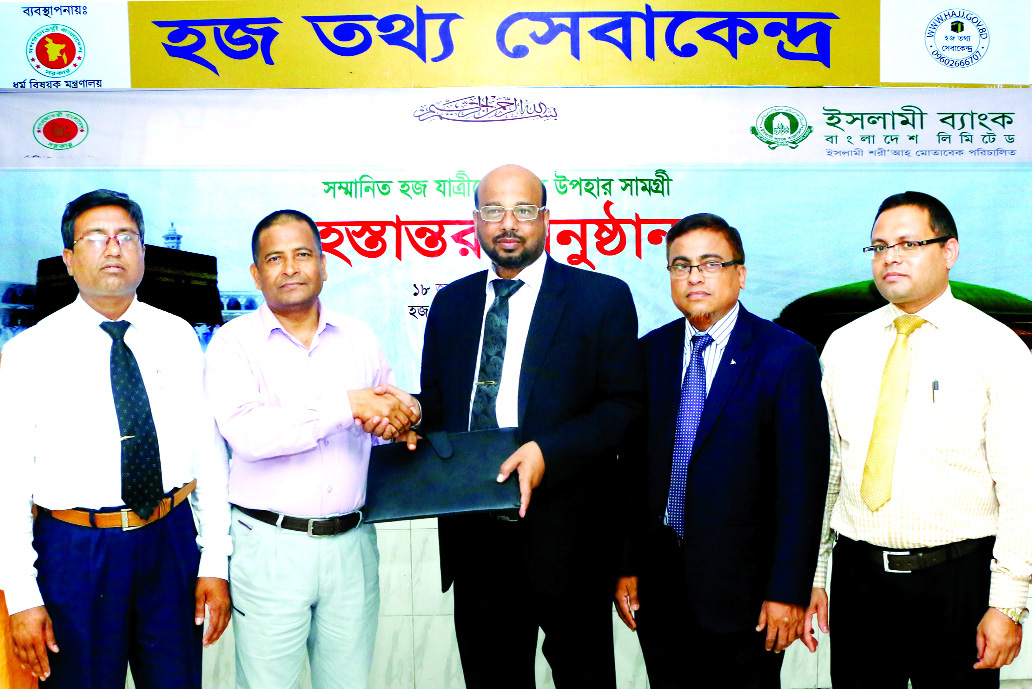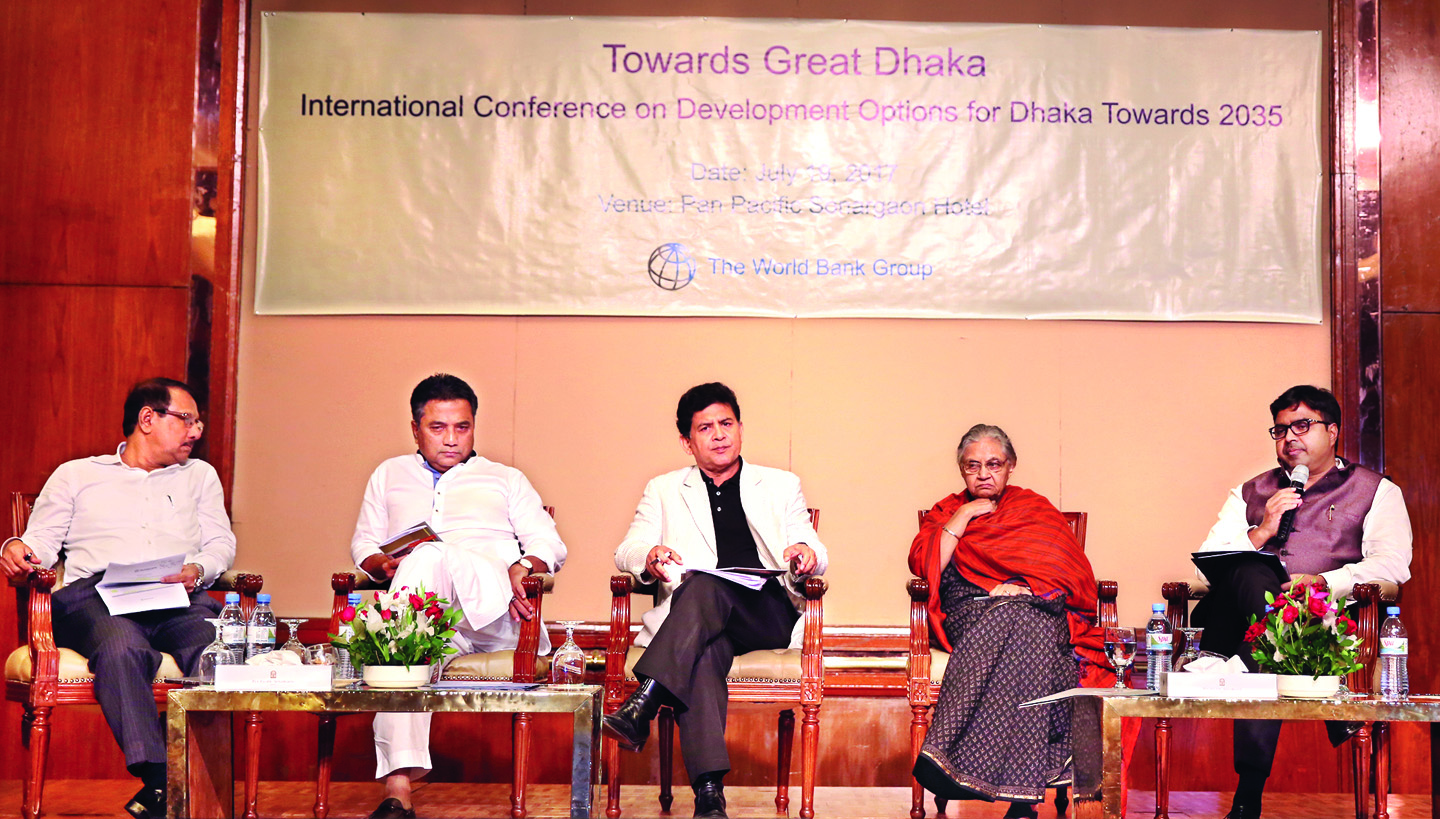Md Touhidul Alam Khan, Deputy Managing Director of Prime Bank disbursing agriculture loan for cultivation of Banana in Kushtia through Poradah SME/ branch recently. Imtiaz Ahamed Bhuiyan, EVP, AKM Enamul Haque, VP and regional head of Rajshahi, Khan Md Ab
 Md Touhidul Alam Khan, Deputy Managing Director of Prime Bank disbursing agriculture loan for cultivation of Banana in Kushtia through Poradah SME/ branch recently. Imtiaz Ahamed Bhuiyan, EVP, AKM Enamul Haque, VP and regional head of Rajshahi, Khan Md A
Md Touhidul Alam Khan, Deputy Managing Director of Prime Bank disbursing agriculture loan for cultivation of Banana in Kushtia through Poradah SME/ branch recently. Imtiaz Ahamed Bhuiyan, EVP, AKM Enamul Haque, VP and regional head of Rajshahi, Khan Md A
Abu Reza Md Yeahia, Deputy Managing Director and Head of Development Wing of Islami Bank Bangladesh Limited, handing over bed foam with cover for pilgrims to Md Saiful Islam, Deputy Secretary of Religious Affairs Ministry at Ashkona hajj office onTuesday.
 Abu Reza Md Yeahia, Deputy Managing Director and Head of Development Wing of Islami Bank Bangladesh Limited, handing over bed foam with cover for pilgrims to Md Saiful Islam, Deputy Secretary of Religious Affairs Ministry at Ashkona hajj office onTuesday.
Abu Reza Md Yeahia, Deputy Managing Director and Head of Development Wing of Islami Bank Bangladesh Limited, handing over bed foam with cover for pilgrims to Md Saiful Islam, Deputy Secretary of Religious Affairs Ministry at Ashkona hajj office onTuesday.
Bank of America picks Dublin as post-Brexit hub
Bank of America announced Friday that it will move its hub for EU business to Dublin from London following Brexit.
The Irish capital will be "the preferred location for (the bank's) principal EU legal entities following the UK's departure from the EU," BofA said in a statement.
"Bank of America has operated in Ireland and engaged in the local community for almost 50 years," chief executive Brian Moynihan said.
BofA, the second biggest US bank by assets, did not specify the employment impact of the decision.
The bank currently employs about 700 people in Dublin and 4,500 in London, and is expected to transfer a small number of jobs from London to Dublin, a person familiar with the matter said.
WB for building smart city in Dhaka's east
Study finds vehicle speed now almost near average walking pace
 A World Bank finding shows Dhaka's traffic congestion costs 3.2 million working hours per day, and suggests building a planned smart city on its eastern front.
A World Bank finding shows Dhaka's traffic congestion costs 3.2 million working hours per day, and suggests building a planned smart city on its eastern front.
In the last 10 years, average traffic speed of the vehicles has dropped from 21 kilometres to 7.0 kms per hour--only slightly above the average walking pace, it revealed Wednesday at an international conference on 'Development options for Dhaka towards 2035'.
Experts at the meet saw no merit in retrofitting the crammed Dhaka city proper as a quick fix, suiting the capital of a graduating Bangladesh in its development strides.
The World Bank organised the international meet in Dhaka where experts from Shanghai and Delhi shared experiences of their development history in a bid to facilitate Dhaka city's development.
National and international experts at the conference suggested formulating a comprehensive strategic plan and a coordinated approach with the government entities for refurbishing Dhaka city for making it a vibrant and livable one.
Meanwhile, Dhaka North City Corporation (DNCC) Mayor Mr Annisul Huq and DSCC Mayor Sayeed Khokon reiterated that except establishment of "city government" it is very difficult for them to develop the capital into an upgraded livable metropolis.
Both said when there will be no coordination among some 56 service- providing agencies in the city,
it will be a real challenging task for developing a vibrant and improved city.
In response, Principal Secretary of the Prime Minister's Office (PMO) Kamal Abdul Naser Chowdhury advised the mayors to make a comprehensive and upgraded plan and then the central government will ensure coordination among different government agencies.
Annisul Huq said: "From my 40 years of business experience and two and a half years as the City Mayor I can say that our efforts for the city development are continuously not sustainable.
"I never see any outcome from any of the previous meetings or discussions on the city development. I hope this expert discussion will be helpful for us to upgrade Dhaka."
He, however, said: "In last two years we worked. Within next two years you will see a new Dhaka which will be a standard and livable one."
Sayeed Khokon told the audience that they want to turn Dhaka city corporations into "City Government" for a better outcome.
Former Chief Minister of Delhi Sheila Dikshit said metro-rail has changed the transportation scenario in the Indian capital from a worst congestion trajectory in the past.
On Shanghai development experience, former Dean of Pudong Planning and Design Institute, China, Mr Zhu Ruolin said 30 years back Shanghai looked like Dhaka.
But proper planning, development works in phases with the investment from external sources, from the central government, from the public and from the local private sector facilitated the change of the face of the Chinese city, he added.
Meanwhile, the WB at the conference revealed that road surface in Dhaka increased by only 5.0 per cent while population increased 50 per cent and traffic by 134 per cent between 1995 and 2005.
Local Government, Rural Development and Cooperatives Minister Khandker Mosharraf Hossain presented a keynote speech at the international conference.
He said they were facing the toughest time with the water logging in the city.
Policymakers, senior government officials, urban planners, civil-society representatives, and private-sector leaders also joined the brainstorming meet on the need for rebuilding Dhaka.
Participants discussed preliminary findings of the WB draft report 'Towards Great Dhaka: A New Urban Development Paradigm Eastward'.
The WB report said the capital of Bangladesh has become one of world's most densely populated cities with 36 per cent of the country's urban population living in Greater Dhaka.
The WB in its report said to achieve its vision of becoming an upper-middle- income country by its 50th birthday, Bangladesh must manage Dhaka's urban growth.
"This includes taking full advantage of East Dhaka -- where there is ample availability of land near the core of the city -- to increase the city's economic opportunities and livability," says the World Bank analysis.
Dhaka's urban development has not kept up with the city's rapid growth, resulting in a messy and uneven urbanization process. Lack of adequate planning has led to congestion, poor livability, and vulnerability to floods and earthquakes.
Qimiao Fan, WB Country Director in Bangladesh, said: "Based on current trends, Dhaka will have more than 35 million people by 2035. A productive and livable city of this scale can make enormous contributions to its citizens and the economy.
"However, Dhaka must seize the opportunity to properly plan, coordinate, and invest for the future to achieve its full potential. As Bangladesh's long-term development partner, the World Bank looks forward to supporting the city's ambitious transformation."
The WB report says Dhaka's urbanization originated along the northern corridor of the central region, and then expanded westward.
"Its Eastern half is mostly rural but has the potential to develop rapidly. Accounting for 40 percent of the city's surface, it has the advantage of being within 5 kms of prosperous areas like Gulshan, which can help support its growth through capital and human resource investments.
"With proper planning and implementation, East Dhaka can become a vibrant pole of activities with higher value added, while helping ease density and congestion in the rest of the city."
"However, if not managed properly, the rapid and unplanned urbanization of East Dhaka will make congestion and livability worse and expose more people to risks from floods and earthquakes," the World Bank warned.
Martin Rama, World Bank Chief Economist for the South Asia Region, said: "Examples from around the world such as Eastern Shanghai's Pudong District and others demonstrate that proper planning and execution can encourage economic vibrancy, improve livability, and ease congestion.
"With Dhaka's huge and increasing population, developing East Dhaka in a sustainable manner is more effective and economical than attempting to retrofit over-built and over-congested areas. The time to act is now."
Qizheng Zhao, former Vice Mayor of Shanghai, China, shared their experiences on transformations in the Eastern Shanghai's Pudong district, Professor Anthony Venables of Oxford University presented four simulation scenarios for Dhaka's development towards 2035.
Centre for Policy Dialogue Distinguish Fellow Professor Mustafizur Rahman, economist Dr Hossain Zillur Rahman, RAJUK Chairman Abdur Rahman, Economic Relations Division Secretary Kazi Shofiqul Azam, Lead Economist of the WB Iffat Sharif and others also spoke at the conference.
Banks asked to open help desks to boost FDI
Bangladesh Bank yesterday asked all banks dealing in foreign currencies to set up at least one dedicated help desk in their Dhaka and Chittagong head offices with competent officials to help potential foreigners in making productive investment.
The banks were given 30 days beginning yesterday and asked to inform the foreign exchange investment department of the central bank.
The banks can play a vital role with their proactive guidance and the regulatory framework was adopted in line with the government placing high priority on attracting and boosting foreign direct investment (FDI). FDI inflow stood at $652.59 million during January-March this year, according to the central bank data.
It includes contributions from economic zones, areas designated for industrial units and with special economic regulations providing entrepreneurs various benefits.
The government plans to develop 100 such zones by 2030 on 75,000 acres of land to create jobs for one crore people and produce goods and services worth $40 billion.
Bangladesh Economic Zones Authority has so far awarded licences to eight local private companies to set up 10 economic zones.
AK Khan and Company, Abdul Monem Ltd, Bay Group, Aman Group, Maisha Group and United Group were each awarded one licence while Meghna Group and Bashundhara Group two.
The government itself is also setting up four economic zones -- Mirsarai economic zone in Chittagong, Mongla economic zone in Bagerhat, Srihatta economic zone in Moulvibazar and Sabrang tourism park in Cox's Bazar.
News:Daily star/20-jul-2017


